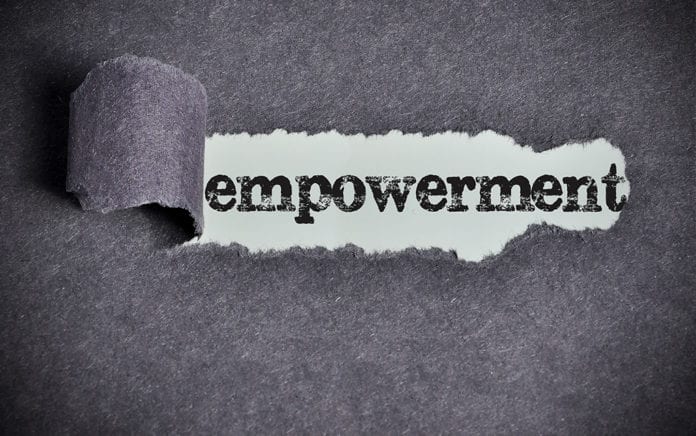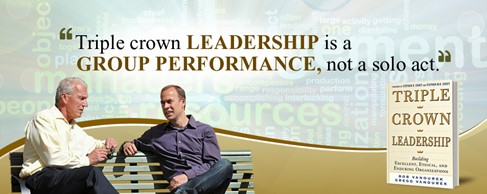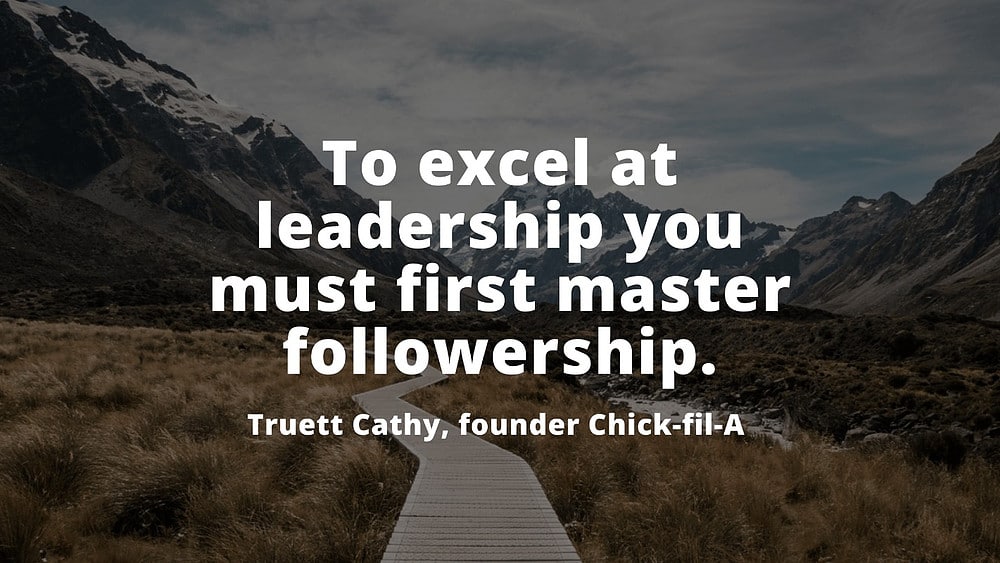In his classic essay, “The Servant as Leader,” Robert Greenleaf (creator of the servant leadership framework), wrote the following:
“Anyone can lead…. There is a problem of getting used to the idea of no single chief, but the passage of time will allay that.”
-Robert Greenleaf
This short statement has profound implications.
Empowerment

Historically, the person at the top of the organizational hierarchy was the boss whose word was virtually absolute. Over time, as management and leadership practices evolved, “empowerment” of others became a trend.
“Collaboration” gained prominence. But a boss who collaborates may still be the boss, kindly allowing others to offer an opinion for him/her to decide. Greenleaf goes way beyond collaboration.
Leaders also embraced “delegation” of authority. But bosses still shouldered ultimate responsibility for the work. The boss could revoke the delegated authority at any time, and people knew it.
A boss could also delegate by written policies noting what a worker could or couldn’t do. But policies took time to develop. Our world moves much faster than policy manual updates. Policy delegation is cumbersome.
After studying management and leadership at AT&T for decades, Greenleaf took empowered leadership far beyond practices like collaboration and delegation. People assumed that a ship can only have one captain. Otherwise, chaos reigns.
“Who’s in charge?”
“Won’t multiple leaders fight for power, or undermine each other, resulting in confusion and conflict?”
Leadership as a Group Performance
Greenleaf’s insight allows the boss to be someone who can at times be a follower, relinquishing the leadership mantle to someone with passion for a project or special expertise. The new leader doesn’t displace the servant leader. The new leader leads on that project, and the servant leader steps aside on that project. There’s no confusion or conflict.
Greenleaf believed that everyone has leadership potential. Servant leadership taps into that potential. Such leadership can be fluid and pervasive in organizations. It ebbs and flows among many people. Leadership becomes a group performance, not an individual act. Such plural leadership is liberating.


Personal Values Exercise
Complete this exercise to identify your personal values. It will help you develop self-awareness, including clarity about what’s most important to you in life and work, and serve as a safe harbor for you to return to when things are tough.
Energized, Engaged Followers Are Essential

Of course, not everyone will choose to lead. They may not have the time or desire. They may lack the expertise or passion for the opportunity. That’s understandable. Great organizations need energized and engaged followers. Not everyone can or should be a leader at all times. Leadership should be a choice.
One of Greenleaf’s key insights was that servant leaders need to become comfortable with following the lead of others. Bosses must sometimes go out of their way not to lead, thereby enticing others to step up. They must tame their egos. And they must resist the temptations of always speaking up, always leading, and always pretending to have all the answers.
Mike Critelli, former CEO of Pitney Bowes, one of Jim Collins’ “good to great companies,” told us he often had to bite his tongue to allow others to lead.
Excellent followership is an underrated and unappreciated skill. Servant leaders need to model the way as good followers for others to observe. Organizational success depends on a culture of leaders stepping up and people dynamically flexing between roles as diligent followers at times and effective leaders at other times.
How to Unleash Other Leaders
The best way for people to learn leadership is experientially. To develop leadership capacity, give people experience leading a manageable project with light coaching from a more experienced leader.
Many people are reluctant to seize the reins of leadership. Jim Unruh, the turnaround CEO at Unisys, told us in our interview for our book, Triple Crown Leadership: Building Excellent, Ethical, and Enduring Organizations, “I was shocked at how very senior executives in the organization wanted me to tell them what to do.”
Fear is what often keeps people from leading. They fear being wrong, looking foolish, hurting the organization, being embarrassed, and more. We feel such fears too. We’ve learned that the best way to conquer fears is by working our way through them. It takes effort to build courage, but we can develop and strengthen it over time.
We’ve discovered three powerful phrases that help leaders empower others to step up and lead:
“I believe in you.”
“I trust you.”
“I’ve got your back.”
Such belief, trust, and protection from consequences help unleash new leaders. When people see this in action, they’re motivated to volunteer for leadership projects. That’s when the organization can really start to thrive.
An Irrevocable License to Lead
![]()
In our book, Triple Crown Leadership, we noted several steps leaders can use to unleash other leaders:
- Collaboratively develop a shared purpose for the organization
- Collaboratively develop a shared set of values to guide behavior
- Collaboratively develop an exciting and inspiring vision for the future
- Give everyone in the organization an automatic, irrevocable license to lead by the shared values.
People in the organization, regardless of title, then have a license to lead, as long as they uphold the organization’s shared values. Unleashing other leaders this way creates a high-performance culture.
Such unleashed leaders:
- recognize leadership as a choice and an opportunity
- model exemplary behavior, reinforcing a culture of character
- speak up when they see someone violating the shared values
- courageously call attention to ethical breaches
These unleashed leaders become servant leaders in a self-reinforcing cycle. Such an organization achieves great results and becomes a wonderful place to work, fueling talent attraction, development, and retention.
Thank you, Robert Greenleaf, for helping unleash the latent leadership potential in so many.

Leadership Derailers Assessment
Take this assessment to identify what’s inhibiting your leadership effectiveness. It will help you develop self-awareness and identify ways to improve your leadership.
Tools for You
- Leadership Derailers Assessment to help you identify what’s inhibiting your leadership effectiveness
- Personal Values Exercise to help you determine and clarify what’s most important to you
- Alignment Scorecard to help you assess your organization’s level of alignment

Alignment Scorecard
When organizations aren’t aligned, it can reduce performance dramatically and cause frustration and dysfunction. With this Alignment Scorecard, you can assess your organization’s level of alignment and make plans for improving it.
More Articles from Our Series on Servant Leadership
- How to Become a Better Servant Leader
- The Essential Qualities of Servant Leadership
- Who Determines If You’re a Leader?
- Why Servant Leaders Outperform Bosses
- Do I Have to Be a Servant Before I Can Lead?
- Why Maximizing Shareholder Value Is Wrong
- How Robert Greenleaf Created Servant Leadership
- The Paradoxes of Servant Leadership
- Boards and Servant Leadership
Postscript: Quotations on Unleashing Leaders
- “The top leader’s job is to get others to lead.” -Bill George, best-selling author, former CEO, Medtronic
- “Leaders don’t create followers, they create more leaders.”-Tom Peters, best-selling author and consultant
- “Growing other leaders from the ranks isn’t just the duty of the leader, it’s an obligation.” -Warren Bennis, leadership author and educator
- “Winning companies win because they have good leaders who nurture the development of other leaders at all levels of the organization.” -Noel Tichy, author and educator
- “One must become a leader of leaders.”- James O’Toole, leadership author and professor
- “The highest calling for any leader is togrow other leaders.” -Robert Whipple, The Trust Ambassador
- “I view my job as not to make the decision myself if I can avoid it, so I’ll ask them, ‘How does this fit in with our values, our mission, and our plan?’” -Steven Rothstein, former CEO, Perkins School for the Blind
- “If you have to lead everything, you’re just aggrandizing yourself. The real world needs empowered project teams, individual leaders, all kinds of folks, to have success in their professions and their lives.” -Bob Hatcher, former CEO, MidCountry Financial
- “The old organizational model where a few people decide things, and then ‘manage’ everyone else, just can’t function in today’s environment…. A team is characterized by the fact that every single person takes the initiative and is a ‘changemaker.’” -Bill Drayton, founder and CEO, Ashoka
- “Leadership at Neusoft is not single people, not the CEO, COO, or the CFO. We need all the leaders from the bottom up.” -Liu Jiren, CEO, Neusoft

Triple Crown Leadership Newsletter
Join our community. Sign up now and get our monthly inspirations (new articles, announcements, opportunities, resources, and more). Welcome!
+++++++++++++++++++++++
Gregg Vanourek and Bob Vanourek are leadership practitioners, teachers, and award-winning authors (and son and father). They are co-authors of Triple Crown Leadership: Building Excellent, Ethical, and Enduring Organizations, a winner of the International Book Awards. Check out their Leadership Derailers Assessment or get their monthly newsletter. If you found value in this, please forward it to a friend. Every little bit helps!

